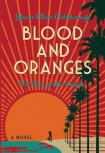Blood and Oranges, James Goldsborough [spicy books to read txt] 📗

- Author: James Goldsborough
Book online «Blood and Oranges, James Goldsborough [spicy books to read txt] 📗». Author James Goldsborough
Dear Miss Mull,
Fresh from seeing the newsreel of your marvelous race with Mr. Hughes and reading your interview sent out by the wire services, I am writing to say that I am thrilled beyond words at your accomplishment and wholeheartedly agree with your comments on the role women pilots can play in the war. At a moment we are experiencing a serious shortage of pilots it is quite wrong to exclude qualified women from the USAAF. In Great Britain, as I’m sure you know, women have been flying for the Air Transport Auxiliary since the war began, thus it can hardly be a question of a lack of female aptitude or competence. It seems to me that the attention you’ve brought to the subject can be used effectively to argue for creation in this country of something similar to the British ATA.
I suggest you write to Lt. Col. Robert Olds in care of the War Department to make the points you made in your interview. Col. Olds is in close contact with General Arnold, commander of the Army Air Corps. I’ve taken the liberty of sending your interview to both men in case they missed it, which I doubt, along with a note that someone should be sent to England to learn more about the ATA. I have also sent the interview and note to my husband.
I think you should be part of any mission to England. It seems to me that the first step is to make an assessment of how many experienced female pilots we have in the United States. Perhaps that could be an assignment for you. You might want to bring the matter up with Colonel Olds or General Arnold.
It is a capital idea you have proposed, and one I fully support.
Yours sincerely,
Eleanor Roosevelt
It was typed on White House stationery and signed simply, Eleanor Roosevelt, in large, bold, slightly masculine script.
Chapter 24
Henry Callender had no one to play chess with. Cal had played with him for a while but then went off to war with all the other young men. His coworkers at the temple didn’t play chess, and even Nyx had lost interest. Nothing was the same anymore, although he gave Angie credit for how she’d stepped in for Willie. The temple was full, the shows, in part because of the war, were more popular than ever and, yes, he had to admit it, Angie had taken the truth of Jesus and hoisted it as high as Willie ever had. Coast to coast, thanks to KWEM radio, she was acclaimed, proof for women everywhere that they could do jobs once done by men only.
But how he missed Willie! A day didn’t pass that he didn’t think of him, the man to whom he owed so much. Nor did a day pass that he didn’t think of Willie’s brother, the man who had cheated everyone.
He still played chess on Willie’s board, the board that once belonged to Grandpa Otto Herzog of Monterey, the board Cal gave to him when he left and that now sat on the coffee table between his sofa and Nyx’s chair. Nyx still occupied the chair, though he mostly slept now, and Henry got no more advice from him. He still played Willie, and Willie sometimes won. He’d played Willie enough to know his thinking and know his moves, and he made them as faithfully as he remembered. But Willie had improvised, too, as any good chess player does, and Henry could not improvise for him. He could improvise for himself, and that gave him the edge, except when improvisation led to disaster and loss, as it sometimes did.
He talked to Nyx more than ever and always on the same subject: There was something wrong in a world where a good man like Willie Mull was murdered and his evil twin thrived, growing ever richer, making a mockery of justice. The Lord has His ways, and that those ways are unfathomable to mortals remained as true as ever. But while accepting the mystery, Henry Callender never had been one to stand by and just let things happen. He’d gotten where he was by doing what had to be done. It had been that way on the trail. Nothing had changed.
Months of brooding weighed heavily on him. In his long life, he reproached himself only one thing: that he had never settled up with Eddie Mull for having robbed him of what was rightfully his. He couldn’t do it when Willie was alive, or rather for Willie’s sake he wouldn’t do it. But Willie was gone, and Henry blamed Eddie for his death.
Callender knew about the Providence, knew about the money that came from the ship, the alms money, gambling money, tainted money, money stolen from people who’d done honest work to earn it. When they prayed together, he’d heard Willie asking the Lord for forgiveness. “Penance, penance,” he would say, words telling Henry he was carrying a heavy burden, the burden of his brother, the man who’d made his fortune through every form of cheating, conniving, stealing, and transgressing and was passing the filthy lucre to his brother as payment for his silence. How could a sinner like Eddie Mull thrive while everyone connected with him was destroyed? What kind of terrible swift justice was that?
One evening, he returned to his duplex, alone as usual, switching on the light, looking to the chessboard, smiling at Nyx. The cat did not move, did not even open his





Comments (0)